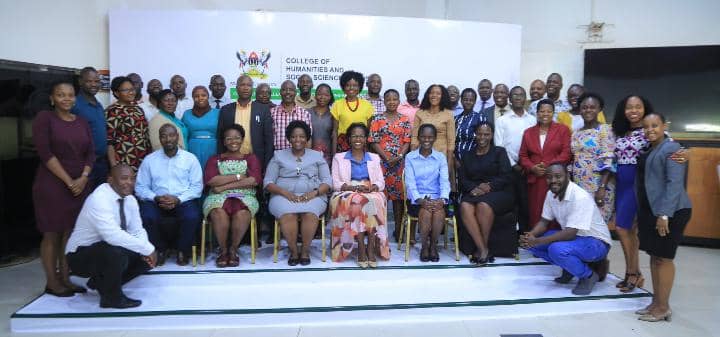By Julius Mugaga Tukacungurwa/Umoja Standard.
Kampala, Uganda: Makerere University Council Chairperson Lorna Magara has reaffirmed the institution’s commitment to becoming a research-led university by 2030, driven by four key pillars: advancing research, strengthening partnerships, building an innovative academic environment, and fostering inclusive governance.
At the 2024 CHUSS Centre of Excellence in Research, Teaching, and Learning (CERTL) International Conference, Magara praised CERTL’s potential to enhance teaching, research, and learning environments, citing its 40+ publications and leadership in research skills training, scholarly writing workshops, and pedagogy excellence.
Magara urged CHUSS to standardize CERTL’s initiatives university-wide, including curriculum reorientation, competency development, and the RATE framework for career readiness.
The Makerere University Council has pledged support for CERTL’s integral role in the institution’s transition to a research-led university.
Magara acknowledged the critical contributions of partners like the Mellon Foundation of New York and Gerda Henkel, emphasizing the importance of partnerships in driving impactful and sustainable development.
Makerere University aims to transition from a traditional teaching institution to a research-driven one, cultivating partnerships with industry, local communities, and international institutions to address real-world challenges.
The university’s 2020-2030 Strategic Plan focuses on building a responsive and innovative institution, improving governance structures, and ensuring equitable engagement with all stakeholders.
CERTL’s mission aligns with Makerere University’s strategic direction, showcasing its potential as a model for replication across the university to enrich research culture and academic practices.
Magara encouraged CHUSS to strategize on institutionalizing CERTL’s initiatives and presenting a plan to the Deputy Vice Chancellor’s office for ongoing support.
The conference highlighted Makerere University’s commitment to excellence in research, teaching, and learning, leveraging centers of excellence to drive its transformation into a research-led University.
Professor Helen Nambalirwa Nkabala, the Principal Makerere University College of Humanities and Social Sciences (CHUSS) emphasized the importance of sharing research with the community, breaking away from the traditional “ivory tower” approach.
CHUSS has been intentional about disseminating research, recognizing its critical role in informing policy and implementation. The college’s “Jua Kali” initiative brings together community knowledge and academic expertise, enriching students’ learning experience.
She also noted, as Makerere University transitions to a research-led institution, sustainability is key. The Centre of Excellence will be integrated into college structures, supporting learners and fostering meaningful partnerships.
Professor Nkabala invited institutions to partner with CHUSS, building on existing conversations. Emphasizing action over mere thinking, CHUSS has already made strides in community engagement and research sharing, setting a precedent for Ugandan and international institutions of higher learning.
The Principal Investigator of the CERTL project, Professor Josephine Ahikire hailed the initiative’s success, thanking the research team for their dedication. Ahikire emphasized the humanities’ resilience amidst neoliberal reforms, declining funding, and the rise of artificial intelligence.
CERTL, a vision for revitalizing humanities education at Makerere University, focuses on innovative teaching, curriculum reform, and student motivation.
The project’s impact extends beyond the college, inspiring excellence university-wide. Ahikire assured the Chairperson of CHUSS’s commitment to research-led excellence, citing impressive research output. She welcomed the Chairperson’s support, promising to work together to build a brighter future. Ahikire’s remarks underscored the importance of collaborative efforts in reshaping humanities education and fostering academic excellence.
Giving details of the project, Dr. Edgar Nabutanyi, coordinator of Melon-funded projects at CHUSS, highlighted the impact of the Center of Excellence. Conceived by Professors Eron Mushenjezi and Elias State, the project focused on hands-on workshops and conferences to enhance teaching, learning, and research.
Key outputs include research by 20 senior researchers, including Dr. James Waseke’s study on students with disabilities, which informed guidelines for lecturers. The project’s legacy includes young academics gaining skills, networks, and publications, positioning them for future leadership.
CHUSS will integrate two key initiatives: new hires workshops and regular writing workshops to promote public engagement. This will empower academics to share their expertise through social media, opinion pieces, and short videos, addressing challenges in disseminating research beyond the university.
The scope of the project
The College of Humanities and Social Sciences, Makerere University received a grant totaling $800,000 from the Mellon Foundation of New York to support the establishment of a Center of Excellence in Research, Teaching and Learning (CERTL) at Makerere University. The primary aim of the center was to explore and develop mechanisms of strengthening and promoting research, teaching and learning in the Humanities and Humanistic Social Sciences at Makerere University.
Launched on September 16, 2020, CERTL has offered Makerere University faculty opportunities to retool their research, teaching and learning practices; recommended opportunities for renewal and pedagogical growth among senior faculty; provided space for critical peer debates and discussions on research, teaching and learning practices; and supported College wide programs of curriculum design and pedagogical innovations.


